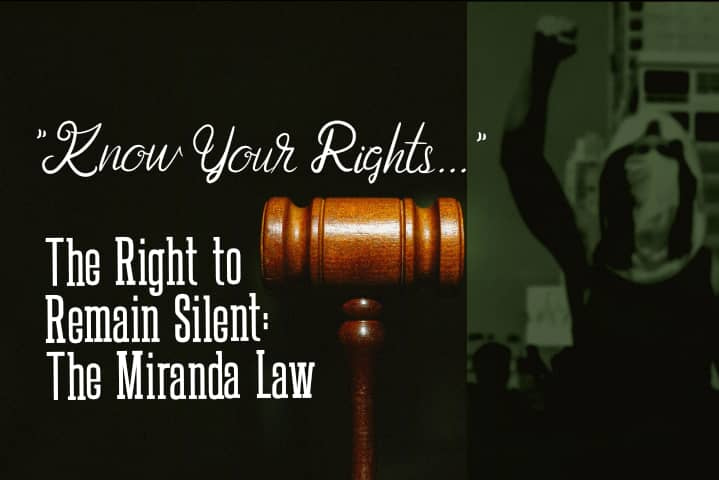RIGHT TO REMAIN SILENT: THE MIRANDA LAW

By Path Solicitors
The Miranda doctrine is a set of universally accepted fundamental rights that by law, must, be recited by an arresting officer to a citizen, before arresting or interrogating that citizen, in lieu of being the suspect of an alleged crime. Also known as the Miranda law / Miranda warning, it is read or recited as follows;
“You have the right to remain silent
Anything you say can, and will be used against you in the court of law
You have the right to an attorney,
If you cannot afford one, an attorney will be provided for you
Do you understand these rights and with these rights in mind do you wish to speak to me?”
The Miranda doctrine was birthed by the criminal justice system of the United States, under the landmark Supreme Court case of Arizona v Miranda. It is named after Ernesto Arturo Miranda, a man arrested and accused of the rape, armed robbery and kidnapping of a young lady, aged 18, in the city of Phoenix, state of Arizona, USA.
Miranda signed a confessional statement, admitting to the alleged charges. During trial, his counsel argued that the statement was not voluntary, and is therefore inadmissible, as Mr. Miranda was at no time informed of his right to keep silent, avoid answering any questions, or his right to an attorney, as provided by the 5th Amendment of the US constitution, which protects against any form of self-incrimination. The Supreme Court, under the leadership of Justice Earl Warren, ruled in favor of the defendant, citing the inadmissibility of the signed confession, as a result of the failure of law enforcement to keep Mr. Miranda abreast with his 5th Amendment rights. The Chief Justice, in his ruling, opined thus;
“…the person in custody must prior to interrogation, be clearly informed that he has a right to remain silent, and that anything he says will be used against him in court; he must be clearly informed that he has a right to consult with a lawyer and to have the lawyer with him during interrogation, and that, if he is indigent, a lawyer will be appointed to represent him”
This landmark ruling would go on to revolutionize both the US and International law enforcement agencies for years to come. Contrary to popular belief, an arresting officer, is not required to follow this doctrine in all arrests. In fact, the only time this law is invoked by law enforcement is when the arresting officer intends to question or interrogate the suspect in question.
Some notable exceptions are
- When an individual is caught red-handed on the scene of a crime
- When an individual flees lawful custody
As provided by the concluding sentence of the warning recital, the suspect also has the privilege to waive the Miranda rights, and must verbally indicate his intention to do so. It is also advised that the suspect verbally invokes his right to remain silent, when he wishes to do so.
MIRANDA RULE IN NIGERIAN LEGAL JURISPRUDENCE
The Miranda Rule and legal protection against self incrimination is explicitly expressed in Sections 35(2) of the 1999 Constitution of the Federal Republic of Nigeria which states thus;
“Any person who is arrested or detained shall have the right to remain silent or avoid answering any question, until consultation with a legal practitioner or any other person of his own choice.”
Further, Section 6(2) of the Administration of Criminal Justice Act, (ACJA) 2015 also maintains an individual’s right to silence when being questioned or interrogated by law enforcement. It provides;
“(2) The Police Officer or the person making the arrest or the police officer in charge of a police station shall inform the suspect of his rights to:
- remain silent or avoid answering any question until after consultation with a legal practitioner or any other person of his own choice;
- consult a legal practitioner of his choice before making, endorsing or writing any statement or answering any question put to him after arrest; and
- free legal representation by the Legal Aid Council of Nigeria where applicable:”
Section 17 (2) ACJA on obtaining a confession, provides thus;
‘…such statement may be taken in the presence of a legal practitioner of his choice, or where he has no legal practitioner of his choice, in the presence of an officer of the Legal Aid council of Nigeria or an official of a civil society organization or a Justice of the peace or any other person of his choice…’
These provisions clearly protect the right of silence of a suspect as enshrined in the Nigerian constitution. So know your right, stay informed.
REFERENCES
http://www.lexadvocatus.com/2017/07/miranda-right-and-application-in-nigeria.html?m=1#:~:text=You%20must%20have%20heard%20this,the%20case%20of%20MIRANDA%20 v
https://www.legalnaija.com/2015/11/the-miranda-rule.html?m=1
